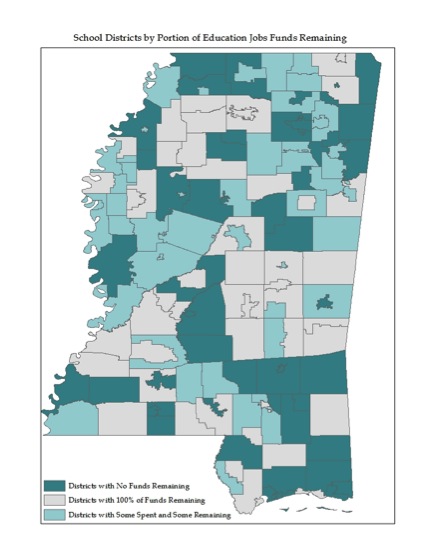K-12 Funding: Separating Fact from Fiction
March 8th, 2011
With the legislative process moving toward final budget negotiations, a number of issues are rising to the surface regarding education funding. One argument to reduce the Fiscal Year (FY) 2012 K-12 education appropriation below the recommendation made by the Joint Legislative Budget Committee harkens back to the Education Jobs money that Congress sent to Mississippi toward the end of last summer. At the time, Governor Barbour took issue with the much-needed resources but ultimately accepted the funds.
The same pot of money is now being used to justify further cuts to K-12 education in the upcoming year. Those in favor of a smaller state appropriation next year are making the argument that school districts were advised not to spend the Education Jobs money in this fiscal year. If the districts did not spend all of the Education Jobs money, as the argument goes, then the FY 2012 state appropriation should factor in those resources and ultimately be reduced.
The argument, however, is loaded with problems. First, it ignores the fact that the current year appropriation for the Mississippi Adequate Education Program (MAEP) was underfunded by nearly a quarter billion dollars and that MAEP has not fully been funded since 2008. Districts have been doing more with less for a number of years.
Second, as a result of the routine underfunding, many districts needed to spend the Education Jobs money this year. The map below shows that 98 school districts have already spent some of the Education Jobs funds this school year.
Click to enlarge
 In total, 98 (or 66 percent of all) school districts have spent some of the Education Job money. One-third of the districts have spent all of the funds and have none available for next year. With less than half of Mississippi’s original funds remaining and more anticipated to be spent this year, the Education Jobs money simply is not available to carry over. To convince the public otherwise is not only misleading, it is a position that ultimately affects the quality of education provided to Mississippi’s children.
In total, 98 (or 66 percent of all) school districts have spent some of the Education Job money. One-third of the districts have spent all of the funds and have none available for next year. With less than half of Mississippi’s original funds remaining and more anticipated to be spent this year, the Education Jobs money simply is not available to carry over. To convince the public otherwise is not only misleading, it is a position that ultimately affects the quality of education provided to Mississippi’s children.





